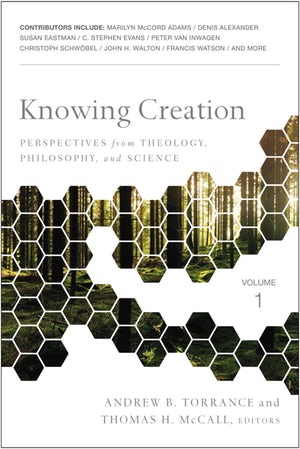Knowing Creation: Perspectives from Theology, Philosophy, and Science, reviewed by Stephen Vantassel
 Andrew B. Torrance and Thomas H. McCall, eds., Knowing Creation: Perspectives from Theology, Philosophy, and Science, Volume 1 (Grand Rapids, MI: Zondervan, 2018), 352 pages, ISBN 9780310536130.
Andrew B. Torrance and Thomas H. McCall, eds., Knowing Creation: Perspectives from Theology, Philosophy, and Science, Volume 1 (Grand Rapids, MI: Zondervan, 2018), 352 pages, ISBN 9780310536130.
In recent decades, the long struggle between science and theology has intensified, forcing Christian theologians to increase their attention on the doctrine of creation. The challenge facing theologians was is how to correlate and contextualize biblical teaching concerning creation with the findings of contemporary science. The effort is difficult because of the diversity and complexity of the issues which include how we got here, the relationship between revelation and reason, free-will and providence, and biblical teaching about nature. Knowing Creation (vol 1.) addresses these subjects through 16 articles by scholars from prestigious schools who self-identify as Christian. The editors explicitly sought to make the book interdisciplinary, arguing that too often academics become siloed in their field (p.18).
The book is organized into four sections each containing four articles: Theological Perspectives, Biblical and Historical Perspectives, Philosophical Perspectives and Scientific Perspectives. While the editors wisely decided to organize the articles by theme or emphasis, readers should understand that some of the categorizations were arbitrary. For example, Mark Harris’ article, “’The Trees of the Field Shall Clap Their Hands’ (Isaiah 55:12): What Does It Mean to Say That a Tree Praises God?” is placed in the Scientific Perspectives section but could have easily been placed in the Biblical and Historical Perspectives.
Given the diversity of topics covered in this text, an integrated review is impossible. So rather than write on all 16 articles, attention will be placed on a few select papers taken from each of the sections.
Section 1 Theological Perspectives
Simon Oliver’s article, “Every Good Gift is from Above” discusses the relationship between culture and nature and how the often-touted dichotomy between nature and culture is problematic (p. 31). In this, Oliver is spot on. The idea that nature is to be understood as non-human assumes an improper understanding of both nature and humanity. In short, it is a false dualism. Oliver contends that viewing creation as a gift from God helps overcome this dualism. He explains this by employing Marcel Mauss’ conception of gifts and giving. Oliver concludes by arguing that food unites culture and nature. He then continues to tease out the implications of the aforementioned premise by drawing on biblical narratives showing how food is strongly associated with reconciliation and communion (i.e. fellowship). In this way, food is both a gift and an offering. Oliver concludes by drawing attention to how food production is tied to much of the environmental problems of our day. Recognizing the interplay between food and culture highlights the importance of creation in our lives and in the biblical narrative.
Oliver’s insights are rather abstract and tend to arrive at theological conclusions that are at times a bit tendentious. Nevertheless, his ideas are stimulating and worthy of engagement.
Category: In Depth, Summer 2019


